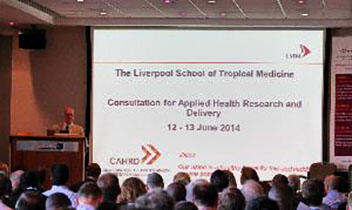
Today sees the arrival of nearly 200 delegates from 15 countries across Europe, Africa and Asia for the inaugural Consultation of Collaboration for Applied Health Research Delivery (CAHRD).
CAHRD, hosted by LSTM, is global network of individuals, disciplines and organisations that facilitates Applied Health Research and Delivery of health interventions, and over the next two days CAHRD partners will determine the strategic direction of their collaboration. This first Consultation, being held at Liverpool Town Hall and the Radisson Blu Hotel, will focus on four themes, using examples of LSTM applied health research and delivery. The themes are: Lung Health (LH); Maternal and Newborn Health (MNH); Neglected Tropical Diseases (NTD) and Health Systems (HS).
Over the next two days discussion papers will be presented and debated by members of the CAHRD network and an external panel including Chris Whitty, Chief Scientific Adviser, DFID, Andy Wright, Director of NTD Programmes,GSK, Morven Roberts, Programme Manager for Global Infections and Global Health Trials, MRC, Mwele Malecela Director General of the National Institute for Medical Research, Tanzania, Matthews Mathai, coordinator of the Epidemiology, Monitoring and Evaluation Team, WHO and Sadia Chowdhury, Executive Director BRAC Institute of Global Health, Bangladesh.
As part of the event, Dr Tim Evans, Director of Health, Nutrition and Population, World Bank will deliver LSTM’s Leverhulme Lecture at Liverpool Town Hall this evening, entitled “"Delivery research in global health: a pregnant moment?" This will be followed on Friday morning by a “Question Time” style debate at the Town Hall with members of the external panel, moderated by former BBC and ITV news presenter Peter Sissons.
Professor Bertie Squire, Director of LSTM’s Centre for Applied Health Research & Delivery, said: “We are delighted that so many of our international partners and colleagues have been able to attend this consultation and I look forward to working with everyone to shape our strategic direction in delivering transformed health systems and improving health in low and middle income countries. It is key that we work together to face the challenges and take opportunities that the next 10-20 years may offer.”